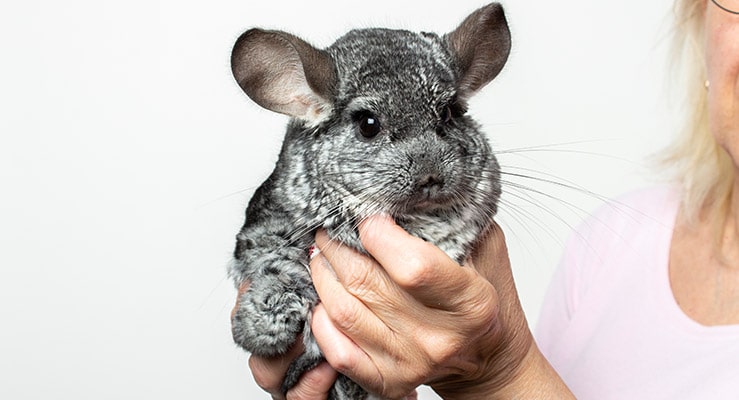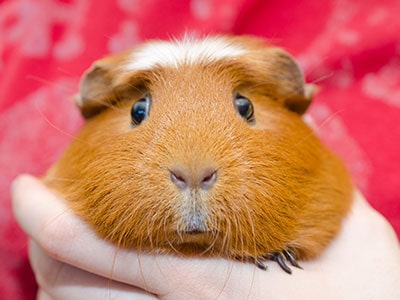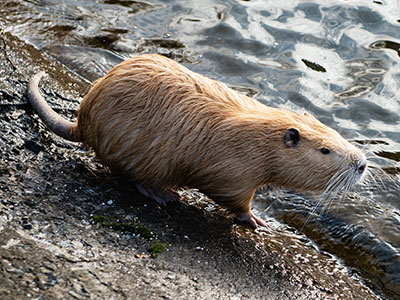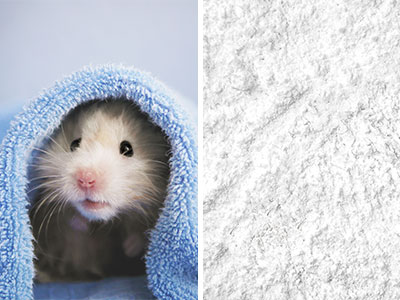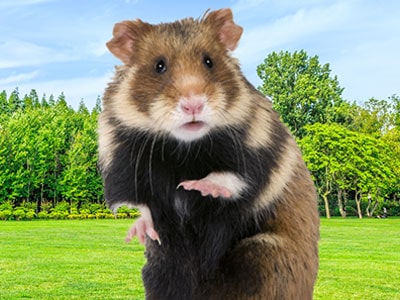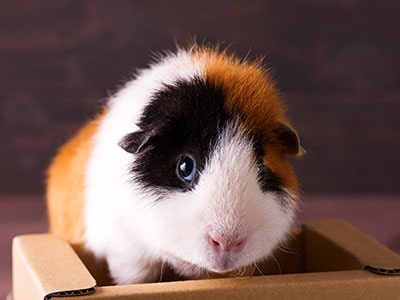Are you eager to get a chinchilla but aren’t sure whether this animal is the right choice for you? We made a list of the pros and cons of keeping chinchillas as pets.
Below are listed the beautiful and some not-so-pleasant aspects of owning chinchillas. This should help you make an informed decision and determine whether this animal ought to become your new family member.
PROS of Chinchillas as Pets
Below are a few positive aspects when it comes to keeping chinchillas as pets.
1. They Are Low-Maintenance Animals
One of the best parts about owning chinchillas is that they don’t require much to have their needs met. Everyday care boils down to ensuring they have enough water, food, and hay, as well as providing them with plenty of safe chew toys. We would also need to clean the cage every week, but that’s still much less demanding than cleaning a litter box every day, right?
2. They Can Live a Long Time
The pain we feel when we lose a pet can be unbearable, so some of us even give up on the idea as a whole out of sheer fear of loss. Fortunately, chinchillas have a long lifespan (compared to dogs, at least) and can live up to 20+ years!
3. They Are (Surprisingly) Very Clean
As strange as it may sound (especially since we’re talking about rodents), chinchillas are rather clean animals that don’t emit a strong odor or have to get regular water baths. Even their poop comes out in the form of hard, odorless nuggets, which makes them all the more desirable as pets.
4. Less Susceptible To Fleas
Unlike dogs or cats, chinchillas aren't so susceptible to common pet pests, such as fleas.
The fur of these animals is, apart from being very soft, incredibly dense, so it’s unlikely that they will suffer a flea infestation any time soon. It can happen if you have other pets around, but infestations are generally rare.
5. Don’t Require Much Attention
Busy professionals always say that they don’t have time for pets because they’re never home. Well, chinchillas don’t need us to be with them all the time and shower them with attention! Indeed, these animals are fond of their cages and don’t mind dwelling in them for the majority of the day. As long as they have enough food and water, as well as something to chew on, they’ll be perfectly content.
6. Can Live Alone or in Pairs and Groups
Chinchillas are lively and sociable animals, but they don’t get too lonely when they are alone. They would appreciate a playmate and could live in harmony with them (until a fight breaks out). However, it’s not a necessity like in the case of some birds (budgies, for instance).
7. Are Entertaining and Affectionate
Though they spend most of their time in their cages, chinchillas are hilarious when let outside. They’ll climb stuff and jump around, eager to check every corner out due to sheer curiosity. They may even jump on their owners to show affection. If you’ve bonded with your chinchilla, it may let you pet it and show other signs it likes you, such as nibbling your ears and sniffing around your hair.
CONS of Owning Chinchillas
Although there are quite a few beautiful aspects in keeping chinchillas as pets, there are also some less pleasant parts that you need to know before making the decision to buy a chinchilla.
1. Require a Temperature-Controlled Environment
The temperature is a major concern of potential chinchilla owners, as the animal has dense fur and can get stressed and overheated quickly. Before getting yours, it’s best to shop for a good air conditioner; that should enable you to keep the temperature around 60°F-70°F. The humidity in the room should also be controlled and range from 40% to 60%.
2. You Have to Give Them Dust Baths Fairly Regularly
Dust bathing, which is a type of maintenance animal behavior, may sound unappealing at first. However, chinchilla care includes regular dust baths (using specially formulated products) since that will keep its coat healthy and silky. A dust bath should also prevent the fur from getting too oily. Unfortunately, it can get a bit messy, and some owners have even reported having allergic reactions to the products.
3. They Have Specific Dietary Needs
Much like some other rodents, chinchillas have sensitive digestive systems and require fiber-rich diets to ensure they stay healthy. This isn’t a pet that you can give your leftovers or some human food and snacks from time to time. There are a number of foods that may poison your chinchilla, and you need to pay close attention to how much they’re eating too so that they don’t become obese. Essentially, you really have to stick with your vet’s nutritional recommendations and ensure your chinchilla is on a healthy digestion-friendly diet at all times.
4. They Are Crepuscular Animals
Yes, chinchillas may rest at times when we’re most active (such as during the day). However, since they are crepuscular, they can disturb their owners at odd times — usually dusk and dawn. In the wild, they’d be most active at these times because there’s less chance they’d fall prey to a predator. This behavior continues even when living with humans. Thus, the easiest solution is simply not to keep the cage in your bedroom.
5. They LOVE to Chew
Chinchillas don’t exactly have a destructive personality as some other animals. However, if you let yours roam around, it will chew on anything it can get its tiny paws on. These animals have to keep grinding their teeth down as they’re constantly growing. Because of that, we need to provide them with lots of chew toys they can nibble on all day long. Otherwise, they will try to chew on stuff they can find in the house or inside the cage — stuff that isn’t safe for them to eat at all!
6. The Initial Costs Can Get High
Don’t worry — chinchillas are still easy to maintain, so their upkeep won’t actually make a huge dent in your budget. But the initial costs of getting a chinchilla and setting up the cage may indeed discourage you. The animal needs an appropriately sized cage and a variety of accessories, including a food bowl, a water bottle, an exercise wheel, a place where it can hide or sleep, etc. Be prepared to spend a few hundred dollars just on the basics.
7. They May Take a While to Bond With You
Finally, know that rodents don’t usually form a super-deep bond with their owners, much like dogs or cats do. In the case of chinchillas, their instinct tells them not to trust people, which makes getting closer to them and on their good side easier said than done. Of course, it isn’t impossible; you just have to take it one day at a time, slowly letting the animal get used to you and realize you won’t hurt it. But it is a lengthy process not many people are willing to go through.
Final Thoughts
As you can tell, we have a tie here, as having chinchillas as pets can be a wonderful experience — but there are some disadvantages to keep in mind as well.
In the end, it all depends on how much effort someone is willing to put into taking care of the animal and developing a closer bond with it. No, chinchillas aren’t like cats or dogs, which can (most of the time) quickly adapt to any home and are usually rather friendly and cuddly. But that doesn’t make chinchillas any worse as pets. In fact, all that effort and time spent gaining the animal’s trust and taking care of its needs is bound to make the whole experience all the more rewarding!

